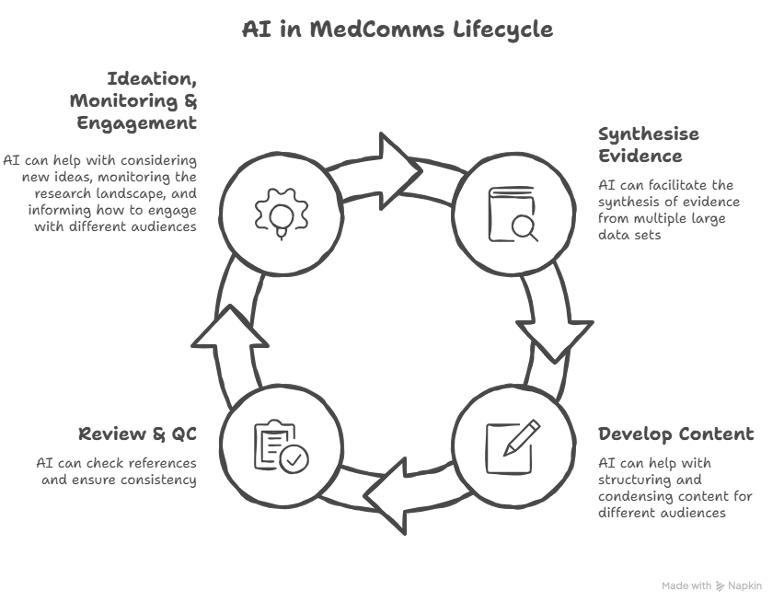Staying Ahead of the Curve: AI and the Future of Medical Communications
The direction is clear: AI will increasingly support the entire research cycle, from lab to communication. The question isn’t whether it will change our work, but when, and how, we choose to evolve alongside it.
As with many other parts of our lives, Artificial Intelligence (AI) is beginning to find its place in Medical Communications (MedComms); Tools like ChatGPT, Copilot, and science-specific AI tools like Consensus and Elicit are starting to reshape the way we think about daily workflows. We’re still in the initial stages of exploration and adoption, with wide-ranging questions about quality, compliance, and trust yet to be fully answered. But the direction is clear: AI will increasingly support the entire research cycle, from lab to communication. The question isn’t whether it will change our work, but when, and how, we choose to evolve alongside it.
Where AI Is Beginning to Make an Impact
AI is being tested and increasingly utilised across the MedComms industry, often by individuals experimenting in their own learning, and increasingly through early organisational pilots. It’s helping with ideation, research exploration, content development, and the synthesis of insights. As MedComms is a highly regulated environment, where accuracy, data privacy, and compliance are essential, most AI use remains experimental and human-supervised; but every pilot teaches us something about how these tools might fit responsibly into future workflows.
From Writer to Strategist
Strong writing and scientific accuracy will always be core MedComms skills, but as AI begins to handle more background and organisational tasks, the value we bring as MedComms professionals will shift towards interpretation, critical thinking, strategic planning, and scientific storytelling.
AI can summarise a study, but not decide which findings are clinically meaningful or how best to communicate them. It can support compliance and consistency checks, but it can’t carry the liability. That responsibility remains with the human author, who must combine scientific understanding with critical thinking, ethical judgement, and clear communication.
As adoption grows, it’s equally important to recognise the limitations and unknowns that come with AI, from how data is stored and used, to the risks of exposing commercially sensitive information or unintentionally amplifying bias. These technologies also raise broader ethical questions about sustainability, transparency, and workforce impact.
What remains constant, however, are the human strengths AI can’t replicate that underpin great communication: collaboration, empathy, and the ability to engage meaningfully with people. These are the skills that turn information into impact, and they’ll only become more valuable as technology becomes more capable.
How to Stay Ahead of the Curve
The best strategy for future-proofing your career within MedComms in the long-term is to invest time in the skills that are innately human: curiosity, judgement, and the ability to connect with people. In the short-term however, there are immediate steps you can take to build an AI skill set that employers will value as they navigate a rapidly changing landscape.
The Future of MedComms
In a few years, using AI may be as normal as using PowerPoint or reference software. The key difference will lie in how confidently and responsibly you use it.
Those who start exploring AI now, even in small ways, will be best positioned to shape its role in future MedComms practice. The goal isn’t to replace what we do, but to elevate how we do it.
The best way to predict the future of MedComms is to help build it.
Contributed by Andie Robinson, PhD, AI Lead & Senior Medical Writer, Amica Scientific



